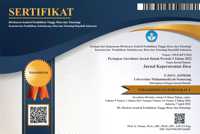Efektifitas Cognitive Behavioral Therapy (CBT) terhadap Resiliensi Penyintas Banjir
(1) Politeknik Kemenkes Bandung
(2) Politeknik Kemenkes Bandung
(3) Politeknik Kemenkes Tasikmalaya
(4) Politeknik Kemenkes Tasikmalaya
(*) Corresponding Author
Abstract
Bencana banjir memberikan dampak pada aspek fisik, psikologis dan sosial. Dampak bencana banjir terhadap kesehatan yaitu jangka pendek dan panjang. Jangka pendek seperti penyakit menular, cedera, dan kerusakan infrastruktur, sedangkan jangka panjang menyebabkan masalah kesehatan mental. Resiliensi merupakan salah satu cara yang dapat dilakukan untuk mengatasi kesehatan mental pada penyintas banjir. Penelitian ini bertujuan untuk mengetahui efektifitas Cognitive behavioral therapy (CBT) terhadap resiliensi penyintas banjir. Desain yang digunakan”Quasi experimental pre-post test with control group” dengan intervensi cognitive behavioral therapy . Responden adalah Penyintas banjir dengan kriteria inklusi sebagai berikut usia 25-60 tahun, tinggal di daerah rawan bencana banjir, riwayat kehilangan saat bencana, dapat membaca menulis, tidak menderita penyakit berat yang mengancam kehidupan. Instrumen penelitian menggunakan instrumen Connor–Davidson Resilience Scale (CD-RISC-10). di provinsi Jawa barat. Jumlah responden sebanyak 126 responden. Tehnik pengambilan sample adalah purposive sampling. Analisis data menggunakan independent t-test dan paired t-test. Hasil penelitian menunjukkan resiliensi meningkat pada penyintas banjir setelah diberikan CBT (p-value= 0,000).
Keywords
Full Text:
PDFReferences
Ainun Rosyida · Miftah Aziz · Yudhi Firmansyah, et. all. (2023). Data Bencana Indonesia Indonesia 2022 Vol. 2, tahun 2023 (A. M. T. H. F. I. A. C. Utomo (ed.); vol 1). PUSDATINKOM BNPB. https://perpustakaan.bnpb.go.id/inlislite/opac/detail-opac?id=2066
Alfriyani, M., & Mustikasari. (2024). Efektivitas Cognitive Behavior Therapy (CBT) Terhadap Kecemasan, Stres dan Peningkatan Resiliensi Pada Korban Pascabencana Banjir : Literature. Journal of Telenursing (JOTING), 6(1), 1213–1220. https://journal.ipm2kpe.or.id/index.php/JOTING/article/view/9747/6009
Chen, C., Xu, L., Zhao, D., Xu, T., & Lei, P. (2020). A new model for describing the urban resilience considering adaptability, resistance and recovery. Safety Science, 128. https://doi.org/10.1016/j.ssci.2020.104756
Clark, M. M., Bostwick, J. M., & Rummans, T. A. (2003). Group and Individual Treatment Strategies for Distress in Cancer Patients. In Mayo Clinic Proceedings (Vol. 78, Issue 12). https://doi.org/10.4065/78.12.1538
Galanis, P., Psomiadi, M. E., Karagkounis, C., Liamopoulou, P., Manomenidis, G., Panayiotou, G., & Bellali, T. (2023). Psychometric Properties of the Greek Version of the Connor–Davidson Resilience Scale (CD-RISC-10) in a Sample of Nurses. International Journal of Environmental Research and Public Health, 20(18). https://doi.org/10.3390/ijerph20186752
Graveline, M. H., & Germain, D. (2022). Disaster Risk Resilience: Conceptual Evolution, Key Issues, and Opportunities. International Journal of Disaster Risk Science, 13(3). https://doi.org/10.1007/s13753-022-00419-0
Hamblen, J. L., Norris, F. H., Symon, K. A., & Bow, T. E. (2017). Cognitive behavioral therapy for postdisaster distress: A promising transdiagnostic approach to treating disaster survivors. Psychological Trauma: Theory, Research, Practice, and Policy, 9. https://doi.org/10.1037/tra0000221
Hayati, U. F., Fatimah, S., & Mardhiyah, A. (2018). Comparative Effectiveness of Cognitive Behavioral Therapy 5 Sessions and 12 Sessions Toward to Post Traumatic Stress Disorder on Post Flood Disaster Adolescent. Jurnal Keperawatan Padjadjaran, 6(1), 37–49. https://doi.org/10.24198/jkp.v6i1.357
Hidayati, N. O., Anwar, M. H., Yamin, A., & Nurhidayah, I. (2023). The Effect of Cognitive Behavioral Therapy for Trauma on Children Victims of Disasters: A Literature Review. Jurnal Aisyah : Jurnal Ilmu Kesehatan, 8(1). https://doi.org/10.30604/jika.v8i1.1574
Junhua Zhang Lixia Yan, S. W. (2025). Effects of cognitive behavioral therapy on internet addiction: protocol for a systematic review and meta-analysis. BMC Psychiatry. https://doi.org/10.1186/s12888-025-06628-3
Kalisch, R., Cramer, A. O. J., Binder, H., Fritz, J., Leertouwer, Ij., Lunansky, G., Meyer, B., Timmer, J., Veer, I. M., & van Harmelen, A. L. (2019). Deconstructing and Reconstructing Resilience: A Dynamic Network Approach. Perspectives on Psychological Science, 14(5). https://doi.org/10.1177/1745691619855637
Keya, T. A., Leela, A., Habib, N., Rashid, M., & Bakthavatchalam, P. (2023). Mental Health Disorders Due to Disaster Exposure: A Systematic Review and Meta-Analysis. Cureus. https://doi.org/10.7759/cureus.37031
Koliou, M., van de Lindt, J. W., McAllister, T. P., Ellingwood, B. R., Dillard, M., & Cutler, H. (2020). State of the research in community resilience: progress and challenges. Sustainable and Resilient Infrastructure, 5(3). https://doi.org/10.1080/23789689.2017.1418547
Leiva-Bianchi, M., Cornejo, F., Fresno, A., Rojas, C., & Serrano, C. (2018). Effectiveness of cognitive-behavioural therapy for post-disaster distress in post-traumatic stress symptoms after Chilean earthquake and tsunami. Gaceta Sanitaria, 32(3). https://doi.org/10.1016/j.gaceta.2017.07.018
Liu, T., Liu, X., Li, Y., Liu, S., & Cao, C. (2021). Evolving Trends and Research Hotspots in Disaster Epidemiology From 1985 to 2020: A Bibliometric Analysis. Frontiers in Public Health, 9. https://doi.org/10.3389/fpubh.2021.720787
Ludolph, P., Kunzler, A. M., Stoffers-Winterling, J., Helmreich, I., & Lieb, K. (2019). Interventions to promote resilience in cancer patients. In Deutsches Arzteblatt International (Vol. 116, Issues 51–52). https://doi.org/10.3238/arztebl.2019.0865
Mavranezouli, I., Megnin-Viggars, O., Daly, C., Dias, S., Welton, N. J., Stockton, S., Bhutani, G., Grey, N., Leach, J., Greenberg, N., Katona, C., El-Leithy, S., & Pilling, S. (2020). Psychological treatments for post-traumatic stress disorder in adults: A network meta-analysis. In Psychological Medicine (Vol. 50, Issue 4). https://doi.org/10.1017/S0033291720000070
Ni, C., Chow, M. C. M., Jiang, X., Li, S., & Pang, S. M. C. (2015). Factors associated with resilience of adult survivors five years after the 2008 Sichuan earthquake in China. PLoS ONE, 10(3). https://doi.org/10.1371/journal.pone.0121033
Paterson, D. L., Wright, H., & Harris, P. N. A. (2018). Health risks of flood disasters. In Clinical Infectious Diseases (Vol. 67, Issue 9). https://doi.org/10.1093/cid/ciy227
Siddiqui, S. A., Mahmood, A., Sheng, Q. Z., Suzuki, H., & Ni, W. (2024). On the Road to Resilience. In On the Road to Resilience. https://doi.org/10.1201/9781032723662
Timalsina, R., Songwathana, P., & Sae-Sia, W. (2021). Resilience and its associated factors among older disaster survivors. Geriatric Nursing, 42(6). https://doi.org/10.1016/j.gerinurse.2021.08.008
UNISDR. (2009). 2009 UNISDR Terminology on Disaster Risk Reduction. International Stratergy for Disaster Reduction (ISDR).
Article Metrics
Abstract view : 19 timesPDF - 4 times
DOI: https://doi.org/10.26714/jkj.13.2.2025.437-446
Refbacks
- There are currently no refbacks.

This work is licensed under a Creative Commons Attribution 4.0 International License.
PPNI Univ. Muhammadiyah Semarang
Jl. Kedungmundu Raya No. 18 Semarang Gedung NRC University of Muhammadiyah Semarang
Phone: 02476740287
Fax: 02476740287
Email: jurkep.jiwa@gmail.com
This work is licensed under a Creative Commons Attribution 4.0 International License.

